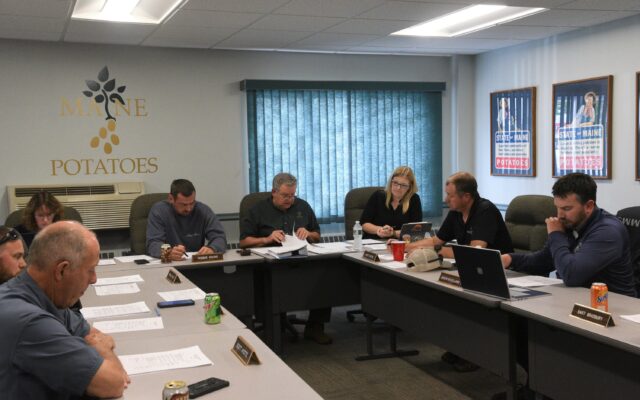
PRESQUE ISLE, Maine — The Maine Potato Board will honor an Aroostook native who has been instrumental in variety development.
Meeting in Presque Isle Wednesday, the board announced that Gregory Porter, professor of agronomy at the University of Maine in Orono, would receive the inaugural Maine Potato Industry Recognition Award.
Porter grew up on an Aroostook County farm and for many years has led UMaine’s potato breeding program, which includes the Aroostook Farm research facility in Presque Isle. He has been instrumental in creating several varieties, including the successful Caribou Russet. He will retire this fall after 38 years in potato research and education.
The board will present the award at its July meeting.
Jake Dyer, the board’s agronomist for variety development, said the last loads of potatoes were shipped out May 12.
Though rainy weather halted planting for nearly three days, most seeds were planted by May 25, he said.
A new storage facility in Masardis, part of the Maine Seed Potato Board, has worked well and potatoes have little shrink or rot, Dyer said.
The board also discussed various bills in process in the Maine Legislature that affect potato farming and agriculture.
LD 1770, An Act to Improve Pesticides Sales and Use Data Collection and Accessibility by the State, passed both the House of Representatives and the Senate on June 15. There was an increase of $160 to $200 per product in the annual pesticide registrations. Around five positions are being moved from the Board of Pesticide Control into their general fund in order to save $500,000, potato board members said.
LD 220, An Act to Support Maine Potato Farmers and Processors, has a combined funding pool of $6 million to support potato farmers through funding sustainable water sources for crop irrigation and drought relief. LD 220 passed the Maine House of Representatives on June 6.
LD 398, An Act to Make Agricultural Workers and Other Related Workers Employees Under the Wage and Hour Laws, puts farm workers under minimum wage. LD 525, An Act to Protect Farm Workers by Allowing Them to Organize for the Purposes of Collective Bargaining, were both heard on the same day.
Jeannie Tapley, board operations director, was present when the Legislature was worked on a compromise. An amendment was put forth to take out the overtime and leave the minimum wage under the employee definition. A clause for concerted activity was put in that allows farm workers to get together to discuss wages like a union would do but doesn’t allow for a third party union, she said.
Both bills passed the House 73-71. In the Senate, the concerted activity clause was removed, and concerns focused on overtime and rest breaks, Tapley said.
LD 1511, An Act to Update the Laws Governing the University of Maine System’s board of Agriculture and to Rename the Maine Agricultural Experiment Station, has been tabled.
Finally, LD 217, An Act to Support Manufacturers Whose Products Contain perfluoroalkyl and polyfluoroalkyl substances, or PFAS, has passed both the House and the Senate. It extends the deadline of January 1, 2023 to report what equipment has PFAS to January 1, 2025 and gives an exemption for small businesses that employ 25 or fewer people.







